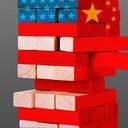How the push to limit Chinese biotech could threaten U.S. edge

Efforts in Congress to restrict U.S. market access for Chinese biotech companies and investors face a central dilemma: They could disrupt key relationships and supply chains U.S. life sciences companies rely on.
Why it matters: Bipartisan consensus for action is growing amid deteriorated U.S.-China relations, but it's running into the reality that they'll have to balance moves to address U.S. national security concerns with the risk of setting back companies that underpin the country's competitive edge.
- The "geopolitics and trade and investment parts of the U.S.-China relationship are on totally different planes," says Scott Michael Moore, director of China Programs and Strategic Initiatives at the University of Pennsylvania.
Driving the news: The House Select Committee on the Chinese Communist Party was scheduled to hold a field hearing on U.S-China biotech competition and national security risks in the sector Tuesday in Boston, but it was postponed due to weather.
- The panel is expected to discuss possible actions to ban certain Chinese biotech companies from operating in the U.S., to stop China from acquiring U.S. biotech companies and to support the U.S. biotech sector.
- Witnesses include Jason Kelly, CEO of Ginkgo Bioworks, a Boston-based synthetic biology company, and Tara O'Toole, executive vice president of In-Q-Tel, a not-for-profit venture-capital firm established by the Central Intelligence Agency, and former homeland security official during the Obama administration.
- Last month the House Select committee introduced a bill that would ban federally funded agencies from contracting with biotech companies connected to U.S. adversaries.
- It's one of three congressional committees — along with Senate Homeland Security & Governmental Affairs and House Ways and Means — that is active on Chinese biotech and possible restrictions.
State of play: A report released last week from the House Select committee highlighted how funding flows from U.S.-based firms to parts of China's tech sector.
- It said five U.S. venture capital firms invested at least $3 billion into Chinese AI and semiconductor companies allegedly linked to the military and human rights abuses.
- Another new report from the nonprofit Future Union details the extensive flow of private capital investments in and out of China that policymakers are wading into.
- The report draws on public and private sources, including Bloomberg, CB Insights, Crunchbase and other databases, to identify U.S.-based investors — largely in private equity and venture capital — funding companies in China, and China-linked firms investing in U.S. companies.
Zoom in: Many of the China-related funds investing in the U.S. identified in the Future Union report are linked to at least one biotech or health care company.
- "It's the rare instance where a cross border investor is not investing in biotech or health care," says Andrew King, executive director of Future Union.
- Outbound investments in Chinese companies also heavily flow to biotech, pharma and health care companies — sectors that weren't singled out in President Biden's executive order last year banning U.S. investment in some Chinese companies.
What they're saying: The suggestion that the American and Chinese biotech sectors can be neatly "disentangled" doesn't reflect the reality of the investments and organization of companies, says Abigail Coplin, an assistant professor of science, technology, and society at Vassar College who studies China's biotech industry.
- There are personal and professional relationships that crisscross campuses, conferences and company boards, shaping the course of technologies and bolstering the biotech sector in both countries.
- "You might be competitors working toward one particular pharmaceutical but on a different project you and another firm, regardless of if they're Chinese or American, have some complementary form of expertise and some kind of cooperative agreement," she says.
- The Future Union report makes a number of recommendations, including a "new private-public process that safeguards knowledge-transfer from the investor class that involves an enhanced vetting and mutual sharing process."
Between the lines: Beyond funding and business networks, U.S. life sciences companies are highly dependent on Chinese firms like WuXi AppTec for research and manufacturing.
- The U.S. is also heavily dependent on active drug ingredients sourced from China — especially for generic drugs, which comprise most prescriptions filled domestically.
- In a letter to the House select committee, the National Security Commission on Emerging Biotechnology acknowledged the impact of potential restrictions on the U.S. biotech sector and called for Congress to consider ways to support them.
- A House select committee spokesperson said delayed action could represent a national security threat.
- "If you think reducing our critical pharmaceutical and biotech dependencies on [China] is difficult now, just imagine how difficult it could be in the future when the CCP weaponizes these vulnerabilities during a moment of crisis," the spokesperson said.
What to watch: Some policymakers argue for swift action, citing the cost of removing Huawei hardware from the U.S. 5G infrastructure after it was well-established in the U.S. market.
- But some analysts predict it won't happen fast. "As with previous [China]-related legislation and regulations, they involve complex economic, commercial and/or technological relationships and interdependencies. Congress will take its time, and action sometime this year is still very likely," TD Cowen analysts Roman Schweizer and Rick Weissenstein wrote in a note Friday.
- There are key unresolved questions, including what the threshold for offshore manufacturing should be, how much reliance on Chinese drug ingredients is too much, and where Congress would get the money to compensate for business disruption, the way it did for semiconductors.
Editor's note: This story has been updated to reflect that the House Select committee postponed its field hearing.